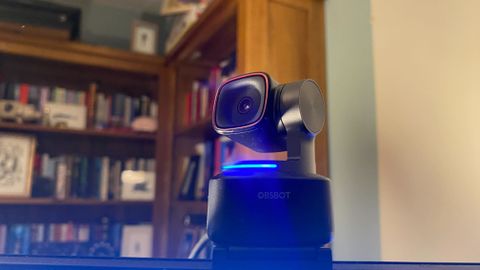GamesRadar+ Verdict
The OBSBOT Tiny 2 is an excellent, cleverly designed camera stuck within a chassis that makes it too complicated for most users, and inflates its price tag beyond what would make this a smart purchase.
Pros
- +
Excellent video quality
- +
Smart, small design
- +
AI tracking tech works almost too effectively
Cons
- -
AI tracking isn't very useful for meetings or streaming
- -
Control sensitivity can lead to wild camera swings
- -
Very expensive compared to other 4K cameras
Why you can trust GamesRadar+
There are parts of the OBSBOT Tiny 2 that I love, and parts of it that I remain confused by after multiple hours of use. Like the original OBSBOT Tiny, a lot of the onus here is placed on AI tracking features, while its core appeal remains a 4K camera in an extremely compact package.
The best webcams often find themselves aimed at either video conferencing or content creation these days, and while the OBSBOT Tiny 2's camera quality is excellent, it's held back in either category by the fact that it wants to be so much more than just a simple webcam.
In reaching for a unique selling point, it's stumbled into a very narrow slice of the market. At $329 / £329, it's far too expensive for the vast majority of buyers, even when compared to close competitors like the Insta360 Link webcam.
Design and Features
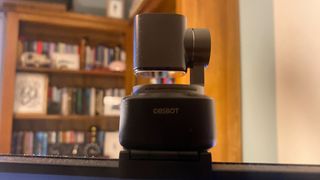
Just like the OBSBOT Tiny 4K before it, the OBSBOT Tiny 2 is a really good webcam first and foremost. I love the picture quality, which does well in both natural and artificial light, never feels washed out by the light from my dual monitors, and does a good job distinguishing focus between foreground and background.
It comes in a really nice little package, nestled comfortably on top of my screen and spinning silently to life as soon as I need a camera or move into a virtual meeting room. When it's inactive, it points down towards its own stand, so I'm never worried that I've forgotten to turn it off. It also comes with a built-in microphone, which isn't bad in a quiet room, but provides a slightly muffled sound. I'd definitely still recommend grabbing one of the best microphones for streaming and gaming, whether you want to give clear callouts to teammates or keep a Twitch chat entertained.
OBSBOT's unique selling feature from the original Tiny returns here, with AI tracking software that moves with the camera's subject matter. It's extremely responsive, and very smooth - leaning back and forth in my chair, the change in the display is so sleek that it can be easy to miss it happening around gradual movements. The tracking can be turned on or off, and the camera itself features voice control, hand controls, and a remote control. Via those control methods, you're able to turn the tracking on or off, zoom the display in or out, and select pre-set, alternative camera positions. All of these methods are just as responsive as AI tracking, but that's not always a good thing.
Performance
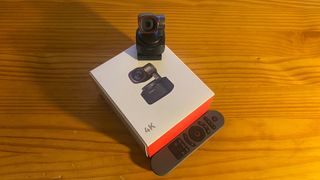
Not long after I set the camera up for the first time, I was in a meeting in which, apparently, my hand made an approximation of the OBSBOT's 'Zoom In' symbol. Out of the corner of my eye, I watched my colleague do a double-take, and, puzzled, I looked towards them to see the camera smash-zooming on my face like something out of a viral TikTok. Thankfully, I'd studied the manual enough to know how to reverse the process, but my meeting had already been derailed.
Funny as that moment was, it pretty successfully encapsulates my biggest issue with the Tiny 2: It fulfills its core function excellently, but dilutes the impressive video quality of something like a Razer Kiyo Pro Ultra with several features that would likely be fulfilled just as well - if not better - by specialized technology, probably for a comparable price. You could pick up a standalone 4K camera, a decent mic, and a stream deck for not much more than the cost of the Tiny 2's RRP of $329.
Of course, OBSBOT is hoping to set the Tiny 2 entirely apart with its AI tracking, and that is undeniably good. It's subtle enough that it's not distracting during meetings, it's easy to turn on and off, and it maneuvers quickly and quietly, even to the extremes of the frame as I move around in my desk chair or lean to grab something off the floor.
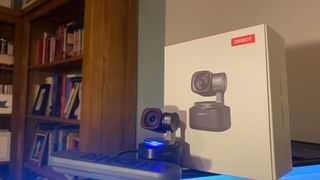
For me, however, no matter how good the tracking remains, it's still not the most necessary feature, and it has messed up on a couple of occasions. Once, a meeting started with the camera pointing off into empty space. Another time, it followed someone else's face out of shot after they leaned in. It's easy to bring the focus back to oneself, but it's frustrating that something even as occasionally distracting as this is attached to a feature that I don't really need.
That feeling - that I don't need the headline feature of this webcam - is something that I've found hard to shake. And it goes deeper than a personal problem because I've struggled to work out exactly what the use case for the AI tracking is. For work meetings, it's simply not necessary unless you're doing some large-scale corporate video presentation on a Teams call - but even that is pretty fringe.
I don't really want a dynamic camera at all in video meetings, so that means no zooms, no tracking, and certainly no unintended smash cuts or rapid re-framings. It's also hard to see the value for the vast majority of streamers, who rely on single-camera setups based on one position they sit in. Even those who do move around will likely be better served by a multi-angle camera setup.
Should you buy the OBSBOT Tiny 2?
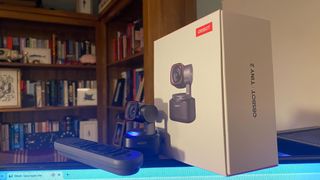
I've thought about it a lot, and the only situation where I could see the Tiny 2's AI tracking being genuinely valuable is for large presentations - a demonstration where an instructor is moving around a physical space while filming for virtual attendees, for example. For that specific instance, I think this would be a great camera, but it feels to me like that represents a very small subsection of the market. The newly beefed-up OBSBOT Tail Air features AI as well, but since it can be used remotely and in a multi-cam setup, that tracking makes a lot more sense.
Eventually, it's a question of price. I'm extremely satisfied with the Tiny 2 as a webcam, but for any way I can think that I would use it in my own life, I would rather buy a stationary 4K camera, a decent microphone, and pocket the rest of the money. That's a shame, because there are aspects of this camera that I really like, and there will be people who can genuinely push it to the limits it was designed to test, but for me - and, I think, for most - the price-to-use ratio just doesn't make sense.
How we tested the OBSBOT Tiny 2
The OBSBOT Tiny 2 was used in a home environment and used as a replacement for a previous 1080p webcam. During that time, it was used on a daily basis, for both work meetings and private calls, in a variety of different lighting conditions.
For more on how we test the latest technology, check out our hardware policy.
For more streaming gear, take a look at the best capture cards, the best green screens, and the best ring lights.

Dead Boy Detectives review: "Delightfully dark, deeply moving, and the perfect companion to The Sandman"

Helldivers 2 dev asks players to stop deliberately shooting at soldiers with that sweet blue pre-order bonus armor that's apparently a yogurt salesman uniform

Stellar Blade release time – the countdown to the new PS5 action RPG is on
